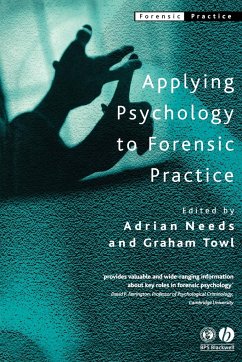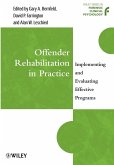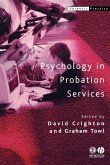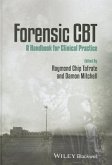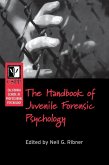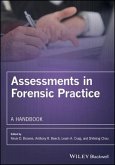The central theme of this book is that forensic psychology can benefit from the insights of many other branches of psychology. The contributors draw on the findings of occupational, cognitive, developmental and social psychology, as well as more familiar clinical and criminological approaches, in order to demonstrate the various ways in which psychology can be applied within the criminal justice system.Chapters include illustrations of the application of psychology to the investigative process, to the analysis of offending, to intervening with offenders, and to increasing organizational effectiveness. The book as a whole reflects the range and synergy that characterize forensic psychology today.
Hinweis: Dieser Artikel kann nur an eine deutsche Lieferadresse ausgeliefert werden.
Hinweis: Dieser Artikel kann nur an eine deutsche Lieferadresse ausgeliefert werden.
"At a time when forensic psychology is playing an important andincreasing role in the criminal justice system the editors of thisbook are to be congratulated on bringing together a wide and wellwritten range of contributions... a must for all forensicpsychologists and their associated colleagues." ProfessorHerschel Prins, Loughborough University
"This comprehensive collection of essays on the emerging role offorensic psychology makes for stimulating reading. Bringingtogether analyses of research techniques, practical discussions onmeeting needs and supporting practitioners, with theories oforganisational development in the criminal justice system, the bookbenefits from its contributors' shared vision of what is requiredin order to successfully tackle and prevent problems of offending."Crispin Truman, Chief Executive, Revolving DoorsAgency
"This wide-ranging book covers many important topics and will bevery useful to scholars and practitioners in providing valuableinformation about key roles in forensic psychology." David P.Farrington, Professor of Psychological Criminology, CambridgeUniversity
"A good marker of how much forensic psychology has developed inrecent years, this thought-provoking book is written by a number ofthe current leading experts (both practitioners and researchers)and provides up-to-date illustrations of some of the most excitingareas in the field. It will appeal to academics and students,people interested in becoming a forensic psychologist, currentforensic psychologists and other psychologists who wish to gain avaluable insight into this expanding area." Dr Peter Banister,Department of Psychology and Speech Pathology, ManchesterMetropolitan University
"Practitioners in forensic psychology will find new insights inthis book whatever their level of knowledge and expertise in theirsubject ... This book, as it promises, is somewhat different fromother texts on forensic psychology and deserves a place on yourbookcase. It will make you think about how more psychology, whichis not forensic, could be adapted, applied, or provide some furtherinsight to the benefit of better forensic practice. While it wouldbe hard to meet all the expectations on the outside cover, it willnot disappoint." Zoë Ashmore, Consultant ForensicPsychologist, The Howard Journal of Criminal Justice, Vol 44 No 1,February 2005
"This comprehensive collection of essays on the emerging role offorensic psychology makes for stimulating reading. Bringingtogether analyses of research techniques, practical discussions onmeeting needs and supporting practitioners, with theories oforganisational development in the criminal justice system, the bookbenefits from its contributors' shared vision of what is requiredin order to successfully tackle and prevent problems of offending."Crispin Truman, Chief Executive, Revolving DoorsAgency
"This wide-ranging book covers many important topics and will bevery useful to scholars and practitioners in providing valuableinformation about key roles in forensic psychology." David P.Farrington, Professor of Psychological Criminology, CambridgeUniversity
"A good marker of how much forensic psychology has developed inrecent years, this thought-provoking book is written by a number ofthe current leading experts (both practitioners and researchers)and provides up-to-date illustrations of some of the most excitingareas in the field. It will appeal to academics and students,people interested in becoming a forensic psychologist, currentforensic psychologists and other psychologists who wish to gain avaluable insight into this expanding area." Dr Peter Banister,Department of Psychology and Speech Pathology, ManchesterMetropolitan University
"Practitioners in forensic psychology will find new insights inthis book whatever their level of knowledge and expertise in theirsubject ... This book, as it promises, is somewhat different fromother texts on forensic psychology and deserves a place on yourbookcase. It will make you think about how more psychology, whichis not forensic, could be adapted, applied, or provide some furtherinsight to the benefit of better forensic practice. While it wouldbe hard to meet all the expectations on the outside cover, it willnot disappoint." Zoë Ashmore, Consultant ForensicPsychologist, The Howard Journal of Criminal Justice, Vol 44 No 1,February 2005

